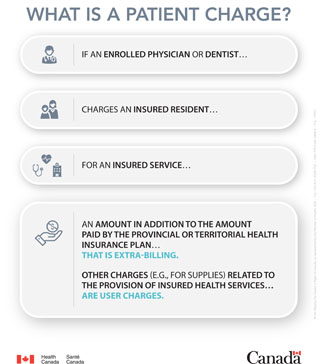Minister must do more to stop unfair patient charges
Canadians are getting hit with unfair fees and bills when seeking medical treatment, a problem the Health Minister tried to address in a special letter sent to the provinces and territories last week.
But public health care supporters say that federal Health Minister Mark Holland didn’t go far enough.
The Canadian Doctors for Medicare in a statement said that the Minister’s instructions to his provincial counterparts “falls short,” because it does not cover the emerging area of virtual care and only focuses on medical services provided by professionals other than doctors.
What’s the problem?
At issue are fees or “patient charges” for medically necessary health services billed to patients receiving care remotely through virtual care, or by a non-physician such as a nurse practitioner that may fall into a grey area of the health care rules.
The federal government expressed concern about patient charges over a year ago. “It is critical that access to medically necessary services, whether provided in-person or virtually, remains based on medical need and free of charge,” stated Health Minister Jean-Yves Duclos back in March 2023.
The Canadian Health Coalition joined with others last fall in urging the release of the so-called interpretation letter of the Canada Health Act by Duclos’ successor, Mark Holland. The Minister issued the letter to provinces and territories on Friday, January 10. The letter was accompanied by a statement.
What’s in the interpretation letter?
The interpretation letter, dubbed the Canada Health Act Services Policy, was supposed to enforce the provisions of the Canada Health Act (CHA) no matter how you received medically necessary care (including virtual care), or who delivered the care (such nursing practitioners, pharmacists, who have been given greater scope in many provinces).
The letter introduces the concept of “physician-equivalent services,” a term rarely mentioned in existing health policy.
“Patient charges for medically necessary services, whether provided by a physician or other health care professional providing physician-equivalent services, will be considered extra-billing and user charges under the CHA,” says the minister’s letter.

What’s missing from the letter?
In 2023, then Health Minister Duclos set his targets on patient charges for virtual care, but Holland’s letter doesn’t mention the growing industry increasingly dominated by a combination of insurance companies, drug store chains, and telecom corporations. “Failing to include virtual care is a major oversight that requires immediate attention,” said Canadian Doctors for Medicare.
Minister Holland also refers to queue-jumping for a fee. “I am also aware that, in some cases, private surgical clinics are offering patients opportunities to jump the queue for surgical procedures that are not an emergency (e.g. cataract surgery, knee or hip replacements, hernia repair) by accessing care outside their home province or territory for a fee.” However, the Minister does not rule this practice contrary to the Canada Health Act, encouraging his staff to monitor the matter.
How will it be enforced?
Since health care is primarily delivered by provinces and territories, it’s up to those governments to bring in rules to enforce the federal government’s interpretation of the Canada Health Act and to provide public funding for physician-equivalent services, such as care provided by a nurse practitioner. If they don’t, then the federal government can withhold funding equivalent to the patient charges (if it can be calculated) from the province’s transfer of health funding through the Canada Health Transfer.
Withholding funding may not sound very compelling, but it is the main tool the federal government uses to encourage provinces to comply with the Canada Health Act.
When will patients get protected?
The new CHA Services Policy will come into effect on April 1, 2026 to allow provinces to adjust, but leaving patients open to continued unfair patient charges for more than a year from now.
What’s next?
The Canadian Health Coalition will work with others to continue to press the federal government to enforce the Canada Health Act and to protect patients from unfair charges – including through virtual care. We are examining the CHA Services Policy closely, including how “physician-equivalent services” might be applied to expand Medicare in future.



